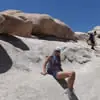Whether you're on a quest to make the world a better place or you just want to ensure the beauty of nature is still around for future generations, Earth Day, which falls on April 22, is one of the best times to honor your passion.
Earth Day activities are a great way to enjoy the outdoors and kick off the start of spring. Here are some ideas to help you find an opportunity to connect with nature.
More: Family Camping Traditions to Start This Year
1. Go Camping
There are few better ways to celebrate Earth Day than with a weekend outside. Many campgrounds are just now opening around this time or are still offering first-come, first-serve sites before the summer season starts. Find a great spring camping destination, and don't forget your spring-specific camping gear.
2. Volunteer Locally or at a National Park
The best way to celebrate Earth Day is to volunteer your time at a local city park or national park you've always wanted to visit. There are many volunteer opportunities across the country; pick one at NPS.gov or EPA.gov. You can also get involved in your region through the Earth Day Network, which has already fostered "a billion acts of green" and is now trying to reach 2 billion.
Learn more at Earthday.org/takeaction.
3. Plant a Tree
Immediately following Earth Day is Arbor Day, on April 25. Get in the spirit and plant a tree with your family. You can plant one in your backyard or find an organized event at ArborDay.org.
4. Park Your Car for the Day
Earth day is all about being outside, celebrating and appreciating the natural world around you. On Earth Day, don't drive to work, the store or your friend's house. Bike or walk instead. Better yet—plan a trip to a local state or national park and spend your day exploring.
5. Start a Compost Bin
Earth Day is a great time to start "greening" your life. One way to do this is to start a compost bin. Americans throw out 25 percent of the food they prepare, which costs nearly $1 billion annually to dispose of. Wasted food typically ends up in landfills, where it can harm the planet.
"Because decomposition in a landfill is static (not moving), no oxygen can enter the process, which produces the greenhouse gas methane," according to Composting Around the Country. The act of composting can divert nearly 30 percent of your waste from the garbage can. Check out to EarthEasy.com for tips on how to get started, to learn what foods you can compost and more.
More: The Guardians of Our Parks
 Find a Campground at ReserveAmerica.com.
Find a Campground at ReserveAmerica.com.



